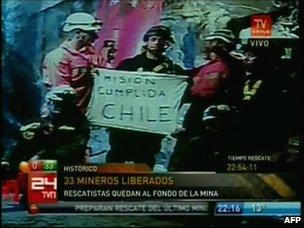Canny media operation sends mine rescue around world
- Published

A smooth rescue operation was accompanied by a well-directed media operation
Mining is a dangerous industry, and for days after the collapse of the San Jose mine, it was feared that the miners on shift at the time would number among the thousands killed around the world each year in accidents underground.
It would have been more bad news for a country still reeling from a massive earthquake which rocked the country in late February.
But with a tenacious rescue attempt which kept searching for 17 days before any sign of life was found, and a meticulously planned and executed rescue, potential tragedy became a rare, big good-news story.
An equally meticulously planned and controlled media operation ensured the story of suspense and tearful reunions was reportedly watched by more than one billion people - and made the new Chilean President Sebastian Pinera a global household name.
President Pinera has used the triumphal story to declare that Chile "is not the same country we had 69 days ago".
To the now-familiar chant of "Chi chi chi! Le le le!", the rescue was spun into an event of nationalist pride that belied, perhaps, the foreign technical help and expertise that was intrinsic to bringing out the miners safely, or the Chilean government inspection agency which is being sued along with the mine owners by one miner's family.
"We did it the Chilean way," the president declared.
Rosental Calmon Alves, professor at the University of Texas and director of the Knight Center for Journalism in the Americas, compared the media event surrounding the rescue it to the landing of man on the Moon in 1969.
"The way that the Chilean government managed to transform the rescue of the miners into an emotional televised show will become a classic case to study," he told the BBC.
Media-savvy president
With some 1,500 local and global journalists at the scene, the Chilean government had to act decisively to maintain control of the way the event was broadcast.
It assembled an official team in charge of broadcasting the event, with sole access to restricted areas - including riveting shots from the cavern in which the men had been trapped 700m underground - and supplying constant live feeds for use by foreign and domestic outlets.
The president - the media-savvy former owner of the Chilevision TV network - was a key figure in the operation, both on camera, greeting each miner as he emerged, but also behind the scenes.
He reportedly ruled out a delayed broadcast, insisting on a live feed but ordering officials not to show shots of miners in poor physical condition.
This may explain why the cameras panned back from miners as they emerged from the capsule, allowing their physical condition to be quickly assessed - preventing distressing images being relayed, for the benefit of the miners but also for the benefit of the news story unwinding in front of global audiences.
He put his own man - Reinaldo Sepulveda - an experienced TV director, in charge of the media operation, which reportedly employed 45 people and eight cameras.
In an interview with Chilean newspaper La Segunda, Mr Sepulveda agreed that the media operation had been the most important of his career. But he also insisted it had not been "a show", and that the feelings of the miners and their relatives had been handled with caution and sensitivity.
Both Mr Sepulveda and the Chilean Mining Minister, Laurence Golborne, sent out regular messages on the micro-blogging service Twitter, giving journalists around the world the minute-by-minute updates needed to service the 24-hour media machine.
"You didn't expect Twitter from a minister," said one BBC graphics journalist.
According to measurements by the Real-time Web Monitor, cited by CNN, internet traffic grew to more than 4 million views per minute on Tuesday, surpassed only by World Cup matches, Wimbledon and Barack Obama's election victory.
"I was tasked with this work and it has been the most exciting I have ever experienced," Mr Sepulveda told La Segunda.
"They say there are billions of people who have seen this. Nothing I've done in Chile has had ratings like this."